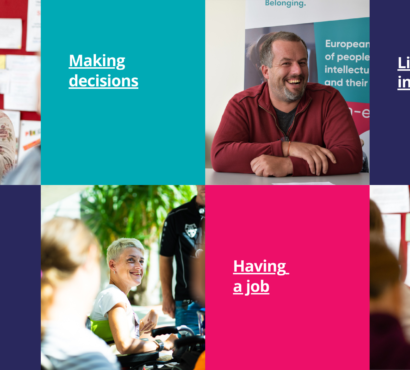European Disability Strategy
Affirming the rights of people with disabilities in the European Union
Strategy for the Rights of Persons with Disabilities 2021-2030
In March 2021 the European Commission presented a strategy for the rights of people with disabilities.
The ten-year strategy sets out key initiatives around 3 main themes:
- EU rights: Persons with disabilities have the same right as other EU citizens to move to another country or to participate in political life. Building on the experience of the pilot project ongoing in eight countries, by the end of 2023 the European Commission will propose a European Disability Card for all EU countries that will facilitate mutual recognition of disability status between the Member States, helping disabled people enjoy their right of free movement. The Commission will also work closely with the Member States to ensure the participation of persons with disabilities in the electoral process in 2023.
- Independent living and autonomy: Persons with disabilities have the right to live independently and choose where and with whom they want to live. To support independent living and inclusion in the community, the Commission will develop guidance and launch an initiative to improve social services for persons with disabilities.
- Non-discrimination and equal opportunities: The strategy aims to protect persons with disabilities from any form of discrimination and violence. It aims to ensure equal opportunities in and access to justice, education, culture, sport and tourism. Equal access must also be guaranteed to all health services and employment.
More about the launch of the strategy:
- information about the launch
- Easy-to-read prepared by the European Commission.
- Commission factsheet
Briefing: EU Disability Rights Strategy (.pdf)
What we wanted from the European strategy
This is what Inclusion Europe wanted the European Disability Strategy to address:
- Address the importance of the right to make decisions;
- Establish clear targets to end segregation;
- Address violence against women with intellectual disabilities;
- Recognise the role of families in fulfilling rights and providing support to their relatives with disabilities;
- Connect to peoples‘ experiences and be easier to understand.
Throughout the strategy, particular attention needs to be paid to:
- Children with intellectual disabilities and their families;
- Women with intellectual disabilities;
- People with complex support needs and their families.
In detail:
- our initial opinion: what we want to see in the strategy (.docx).
- Specific expectations (.pdf) submitted during consultations in October 2020
European Disability Strategy 2010-2020
Information about the strategy.







